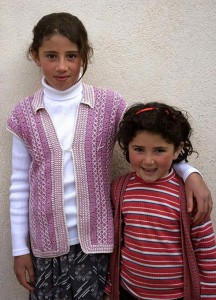By Kim Plummer Krull
When asked why they left their homes thousands of miles away, a group of 10 children newly arrived in Texas offered a one-word answer: “Hambre,” the Spanish word for “hungry.”
One boy, around 13, said his life was threatened when money sent by his mother was discovered by people who forced him and his siblings from their home, said Evan Moilan, chief mission officer with Lutheran Social Services of the South (LSSS).

“These children have been in some desperate situations,” said Moilan, who spoke with the youngsters on behalf of LSSS, the Austin-based LCMS Recognized Service Organization that’s expanding its refugee resettlement services with the help of a $100,000 grant from the LCMS Office of National Mission.
In response to what’s been called a “tidal wave” of undocumented and unaccompanied Central American children crossing Texas borders, LSSS is using the grant to help open an emergency shelter in McAllen and provide Spanish-language Bibles and devotional materials for as many as possible of the 6,000 young immigrants it expects to serve over the 12 months that began Aug. 1.
Plans are in the works to open the New Hope Emergency Shelter by Oct. 1 in a vacant McAllen hospital leased by LSSS. The new facility will provide services for youngsters ages 12 to 17, enabling LSSS to care for about 160 additional immigrant children each month.
“Our goal is to connect the children with family and ensure that they have a safe place to be while they’re going through the immigration system,” Moilan said of the LSSS work that is done through contracts with the U.S. Office of Refugee Resettlement.
The new shelter will be the fourth LSSS refugee resettlement program. It’s modeled after the Bokenkamp Children’s Shelter in Corpus Christi, which has served young immigrants since 2006.
But while LSSS providing care for immigrant children is not new, the explosion in the growing number of unaccompanied minors entering the U.S. is creating record needs, Moilan said.
During its last fiscal year, LSSS served 1,567 children through refugee resettlement programs; this fiscal year, the agency expects to care for more than three times that number, providing “the highest degree of care, with integrity, to serve the least of these,” Moilan said, in reference to Matt. 25:40.
Misconceptions amid controversy
During the 15 to 20 days a young immigrant typically lives in an LSSS shelter, the faith-based nonprofit provides food, clothing, medical and spiritual care, plus case management to help find family members if they are believed to be in the U.S.
Children typically stay in an LSSS shelter “for a short time before they are reunited with a family member willing to sponsor them,” said Moilan, adding that most of the youngsters arrive hoping to connect with a relative.
That doesn’t mean a youngster will be allowed to remain permanently in the U.S., he stressed, but that the child enters the immigration system where a decision will be made about the child’s status.
In addition to the emergency shelter for older immigrant youth, LSSS provides Transitional Foster Care programs geared primarily to children under 12.
These youngsters receive medical and case-management services at centers in Corpus Christi and El Paso but live with Spanish-speaking foster families in a temporary home environment.
“With their comfort and level of care in mind, we seek to place these children in transitional foster-care homes with special families who have gone through training,” Moilan said.
Amid the controversy surrounding the immigrant-children crisis, misconceptions thrive, including that every youngster who crosses the border is sick, Moilan said. “The large majority has only minor health issues: bumps and bruises from their journeys, dehydration and malnutrition,” he said.
“The children we’re seeing are the nicest and most polite children, with no behavior issues,” he added. “They are healthy despite coming from some remarkably difficult situations.”
Along with the hope of reuniting with family, most of the children leave their home countries to escape abusive situations or prevalent violence or to seek better educational and employment opportunities, according to information provided by LSSS. The largest numbers of children are migrating from Honduras, Guatemala and El Salvador.
As the U.S. government reports that as many as 90,000 child immigrants could cross the border by the end of the budget year in September, LSSS is exploring sites in San Antonio and Houston to determine the feasibility of opening additional refugee resettlement programs.
Also in the works is a disaster response-style program in the Rio Grande Valley, with LSSS and faith-based and community partners providing Christian care even after the crisis fades from headlines.
Children ‘in desperate need’
While politicians and pundits debate the legal, financial and humanitarian issues, LCMS and LSSS leaders focus on reaching out to fill physical and spiritual needs.
“The church is the house of mercy,” said the Rev. Bart Day, executive director of the LCMS Office of National Mission. “We care for the needs of those who are here. When we have opportunity to care for basic human needs, as well as share the Gospel, the church responds with the compassion and mercy of Christ. That is what we are doing with these children in Texas.”
LSSS Chief Executive Officer Kurt Senske draws a comparison to the Good Samaritan, calling the mission of LSSS “to serve the least of these while faithfully following the laws of the land.”
“The children that we are asked to care for often come to us malnourished, frightened and in desperate need,” Senske said. “Like the Good Samaritan, we are privileged to serve those who are placed in our care.”
Although many refugee-resettlement expenses are covered by the federal government, LSSS will incur non-reimbursable costs to operate and expand such services in 2015. In addition to prayers, financial gifts are most needed to help immigrant children in need, Senske said. To make a gift or learn more, visit lsss.org.
Kim Plummer Krull is a freelance writer and a member of St. Paul’s Lutheran Church, Des Peres, Mo.
Posted Aug. 14, 2014
